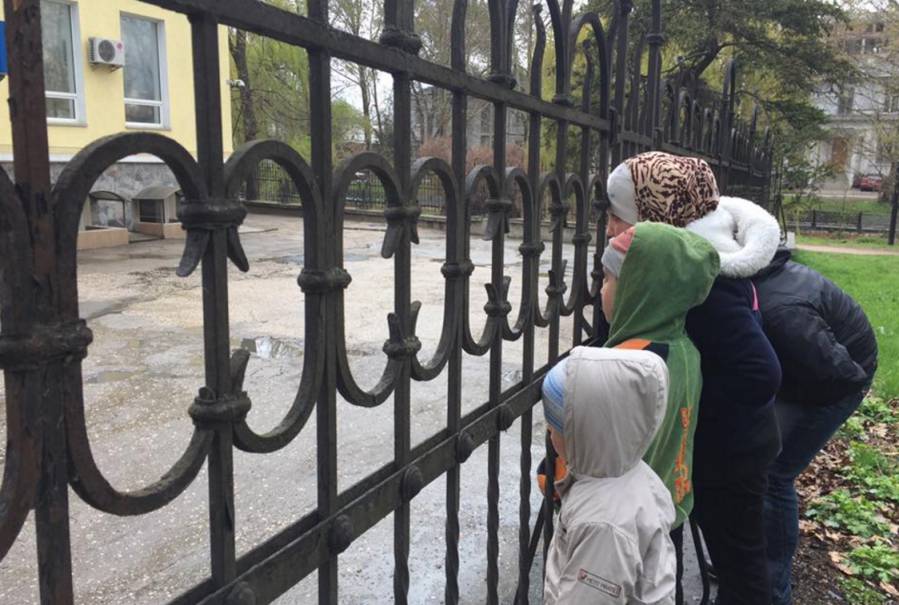• Topics / Human Rights Abuses in Russian-occupied Crimea
Russia turns to closed courts for political prisoners in occupied Crimea

Courts in Russian-occupied Crimea have now begun banning relatives and friends from attending court hearings – the only chance many have of seeing the imprisoned men. Most incredibly, the FSB has now told a court that the men should remain in custody as they are recognized internationally as political prisoners!
Courts in Russian-occupied Crimea have now twice refused to allow relatives and friends into court hearings on extending the effectively indefinite detention of men held prisoner on fundamentally flawed charges. The move is at very least brutal, since these hearings are often the only opportunity for wives, parents, and sometimes children to see the men. Questions must, however, also arise as to what the courts are trying to hide. Some of the prisoners have spoken at previous hearings about both the political nature of the proceedings, and about the torture methods used against them.
At closed court hearings on the detention of 6 men from Yalta on April 6, and of 4 men from Bakhchysarai on April 9, all objections from the defence were rejected and the terms of detention extended. As at previous – open – hearings, the prosecution could find no convincing reason for the men’s detention but this was ignored by the court. Lawyer Emil Kurbedinov reports one extraordinary addition to the ‘arguments’ presented on April 9. The FSB produced material demonstrating that the men are considered political prisoners by Ukraine and the international community. You might have hoped that this could serve as grounds for reflection, but that was not to be. The material was presented as ‘proof’ that the men should not be released, because they “will be helped to escape”, with this meekly accepted by the court.
Human rights defender Emir-Usein Kuku; Muslim Aliev; Enver Bekirov and Vadim Siruk were arrested on Feb 11, 2016, after armed and masked men burst into their homes and those of others, using gratuitous force and terrifying children who had been fast asleep. On April 18, two very young men – Refat Alimov and Arsen Dzhepparov – were also arrested as part of this so-called Yalta ‘case’.
The same armed searches were carried out on May 12 in Bakhchysarai, with four men arrested: Rustem Abiltarov; Zevri Abseitov; Enver Mamutov and Remzi Memetov.
All men are charged with involvement in Hizb ut-Tahrir, a pan-Islamist organization which is legal in Ukraine.
Russia’s ‘Hizb ut-Tahrir case’ have been called a conveyor belt of repression, with the charges standard and convictions effectively guaranteed. Russia has never provided any sensible reason for banning as ‘terrorist’ an organization which has never committed or called to acts violence and which is legal in most countries. This is invariably ignored by investigators, prosecutors and judges, as is the lack of any proof against individuals accused of involvement in the organization.
That, at least, is the case in Russia. In Russian-occupied Crimea, however, lawyers have demanded to see proof and have publicly spoken of the violations of their clients’ rights. During the arrests above, and those near Simferopol in October 2016, friends and neighbours have come out onto the street, in peaceful solidarity with the men and protest.
This is clearly not to the Russian FSB’s liking and several activists have themselves been detained and either fined or jailed on overtly fabricated charges. The aim is clearly to frighten them and others and deter them from showing solidarity. Thus far, the methods have been unsuccessful.
In each of four ‘cases’, including the above, one person is designated the role of ‘organizer’, with this carrying a sentence of up to life imprisonment, while the other men are accused of taking part and also face huge sentences.
The first four men arrested: Ruslan Zeitullaev, Nuri Primov; Ferat Saifullaev and Rustem Vaitov from Sevastopol were convicted in September 2016. The judge lacked the courage to acquit the men, but changed the charges against Zeitullaev from ‘organizer’ to ‘participant’ and handed down the lightest possible sentence in all cases.
This too was not part of the plan and Zeitullaev’s sentence was challenged and obediently revoked by the Russian Supreme Court. A ‘retrial’ is now being played out, with the same flawed ‘evidence’, but the judges unfortunately likely to pass the sentence that the FSB demanded.
The four men from Sevastopol have been recognized as political prisoners by the renowned Russian Memorial Human Rights Centre, and it is only a question of time before all 19 men receive this status. In its Resolution of March 16, 2017, the European Parliament named all 19 men (and other political prisoners), demanding that Russia release them immediately.
See Russia invades Crimea then jails Crimean Tatars, other Ukrainians for ‘terrorism’ and more information about particular prisoners imprisoned on so-called Hizb ut-Tahrir charges
2015 Nuri Primov; Ferat Saifullaev; Rustem Vaitov; and Ruslan Zeitullaev
Feb 2016 Emir-Usein Kuku (a human rights activist); Muslim Aliev; Envir Bekirov and Vadim Siruk
April 2016 Arsen Dzhepparov and Refat Alimov
May 2016 Enver Mamutov, Rustem Abiltarov, Remzi Memetov and Zevri Abseitov
Oct 2016 Timur Abdullaev; Uzeir Abdullaev; Emil Dzhemadenov; Aider Saledinov Rustem Ismailov





